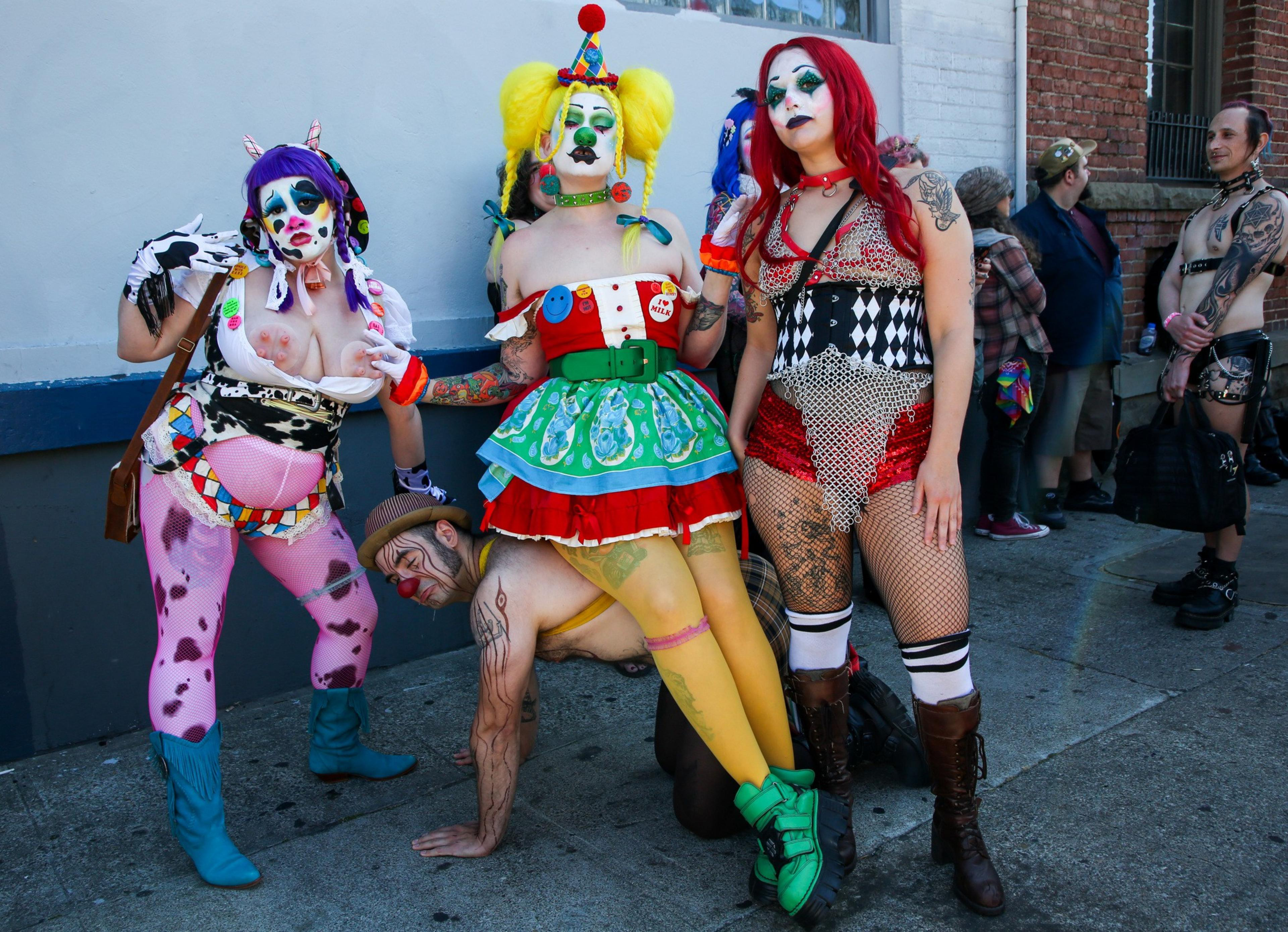San Francisco’s famed Folsom Street Fair marked its 40th year with whips, leashes, chains and unapologetic queerness on Sunday afternoon.
The city’s annual celebration of sexual liberation wasn’t an event for the faint of heart: Kinksters and queers clad in latex, leather and little else flooded the South of Market neighborhood, the former industrial district where San Francisco’s leather and BDSM scenes flourished (opens in new tab) in the decades from the 1960s to the 1980s.
On Sunday, nearly naked wrestlers tussled on raised stages, kink experts used neon-orange ropes to tie up volunteers and urophiliacs played in a kiddie pool full of pee.

“I definitely spent a good amount of time watching the queer wrestling,” said Ty Wright, a Sacramento resident who came into town for the fair. “This is cheesy, but when they’re talking about the ‘American Dream’ and the freedom aspect, this is what they thought they were talking about.”
Since its founding in 1984, the Folsom Street Fair (opens in new tab) has offered an underground alternative to the June LGBTQ+ pride events that have become increasingly mainstream. Sunday’s gathering, on the other hand, remains an unabashed celebration of the Bay Area’s kink, leather and alternative sexuality communities. Folsom Street, in particular, is known as a historic hotbed of gay bars and sex clubs.
Sunday’s fairgoers enjoyed performances and demonstrations on eight different stages, which included “delightfully dirty” drag shows from the famous Stud Collective—the worker-owned cooperative behind San Francisco’s self-described “oldest queer bar”—and Oaklash.

‘We’re Naked, but Safe’
The fair showed no sign of slowing down as it celebrated its fourth decade. Tens of thousands of people packed the streets of SoMa, and the lines outside clubs like Powerhouse and Oasis spanned multiple blocks. The fair was so congested at times that it was nearly impossible not to run into someone—or some part of them.
DJ, an Atlanta resident who declined to give his last name, citing his military affiliation, attended his first Folsom Street Fair on Sunday—hammer in tow.
“I like impact toys, and I like hitting people with impact toys, so I knew I needed to buy this,” DJ said, brandishing his red-and-black Thor-style hammer. A stranger approached DJ as he spoke and asked to be hit with the toy.
Needless to say, DJ obliged.

The fair spanned Ninth to 12th between Howard and Harrison streets and included dozens of booths packed with leather garb, sex toys and other LGBTQ+ wares.
Ashley Montgomery, owner of fantasy dildo shop the Crafty Hedonist (opens in new tab), was hawking dozens of homemade silicone dildos. Montgomery’s rainbow arrangement of toys included one insertable in the shape of tentacles, a handful that were dyed bright pink and iridescent purple, and one jumbo member the size of an arm.
Montgomery reflected on the importance of traditions like the Folsom Street Fair that allow people to let their freak flags fly without fear of retaliation or judgment.

There were furries dressed head-to-toe in animal costumes and stark naked folks of all ages. Celebrants unabashedly displayed their kinks and BDSM preferences on city streets.

“I’m surrounded by like 38% naked people, and I’m not worried about it,” Montgomery said. “We’re naked, but safe.”
Safety and consent were core themes at this year’s event. Alongside shops selling sex toys, the LGBTQ+ and kink fair also prominently featured public health messaging, a nod to worries about the spread of the Mpox virus in the LGBTQ+ community in recent years.
Several community partners boosted ads for HIV-prevention medication, HIV and hepatitis testing, and queer mental health.
“A lot of people that are kinky and queer and poly; they’re trying to find therapists that understand them and won’t pathologize them right away,” said David Khalili of Bay Area Open Mind Group, a collective of therapists affirming gender and sexual diversity.

“We hear from clients who talk to therapists who say, ‘Well, you’re depressed because you’re kinky.’ It damages clients significantly,” Khalili added.
Organizers say the fair—which is sponsored by the city along with a variety of local groups—has raised some $7 million for LGBTQ+ groups over the years.
And as the political discourse surrounding LGBTQ+ visibility grows increasingly fraught, the Folsom Street Fair demonstrated San Francisco’s steadfast commitment to freaky fun.

“I’ve been coming since 90-something—but I finally started becoming me once I started putting on the fairy stuff,” said Murias, who only goes by their surname. “These are my people. It’s also therapy: It helps me express ‘me,’ and I can be myself in public. And that’s important.”
Correction: A previous version of this story incorrectly spelled the name of David Khalili of Bay Area Open Minds.
PHOTOS: Up Your Alley Street Fair Brings Kinky Sex to San Francisco






